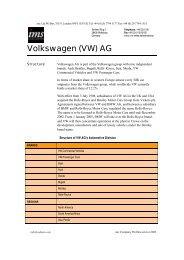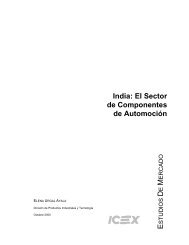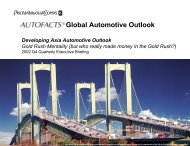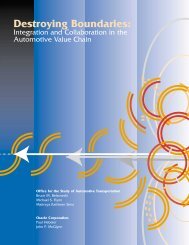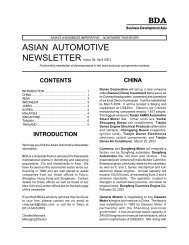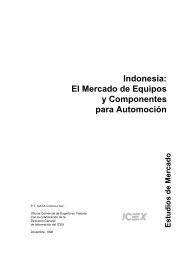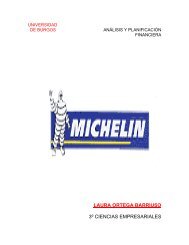Magna International Inc. - OMEGA
Magna International Inc. - OMEGA
Magna International Inc. - OMEGA
You also want an ePaper? Increase the reach of your titles
YUMPU automatically turns print PDFs into web optimized ePapers that Google loves.
We are dependent on outsourcing by North American and European automobile manufacturers<br />
We are dependent on outsourcing by our North American and European automobile manufacturer customers. The extent of<br />
this outsourcing is dependent on a number of factors, including:<br />
• the cost, quality and timeliness of external production relative to in-house production by automobile manufacturers;<br />
• relative technological capability;<br />
• the degree of unutilized capacity at automobile manufacturers’ facilities;<br />
• collective bargaining agreements between labour unions and automobile manufacturers; and<br />
• relations between labour unions and automobile manufacturers.<br />
Any significant decrease in outsourcing by automobile manufacturers would likely have an adverse effect on our profitability.<br />
Technological and regulatory changes may adversely affect us<br />
Changes in competitive technologies or regulatory or industry requirements may render some of our products obsolete. Our<br />
ability to anticipate changes in technology and regulatory or industry requirements and to develop and introduce new and<br />
enhanced products successfully on a timely basis will be a significant factor in our ability to grow and remain competitive. We<br />
may not be able to anticipate or achieve the technological advances necessary for, or to comply with regulatory or industry<br />
requirements in a manner which will allow, us to remain competitive and prevent our products from becoming obsolete. We are<br />
also subject to the risks generally associated with new product introductions and applications, including lack of market<br />
acceptance, delays in product development and failure of products to operate properly. Any of these changes could have an<br />
adverse effect on our operations and financial condition.<br />
Unstable energy prices could reduce global demand for automobiles and increase our costs, resulting in lower profits<br />
The price of crude oil has been unstable in recent months. Material increases in the price of crude oil have, historically, been<br />
a contributing factor to the overall reduction in the global demand for automobiles. A significant increase in the price of crude<br />
oil could further reduce global demand for automobiles and shift customer demand away from larger cars and light trucks<br />
(including sports utility vehicles) in which we have relatively higher content. Oil-based products are also critical elements in<br />
various components utilized by us and our suppliers, including resins, colorants and polymers. Material increases in the price<br />
of crude oil, natural gas or in energy would likely increase the cost of manufacturing or supplying some of our products and we<br />
may not be able to pass these increased costs along to our customers, thereby reducing our profits.<br />
Risks Relating to Our Business<br />
Decreases in production volumes of specific vehicles or products by our customers could have an adverse effect on our<br />
profitability<br />
Although we supply parts to most of the leading automobile manufacturers, the majority of our sales are to three automobile<br />
manufacturers. Our worldwide sales to DaimlerChrysler, General Motors and Ford represented approximately 29%, 24% and 19%,<br />
respectively, of our total consolidated automotive sales in calendar 2001. Moreover, while we supply parts for a wide variety of<br />
vehicles produced in North America and Europe, we do not supply parts for all vehicles produced, nor is the number or value of<br />
parts evenly distributed among the vehicles for which we do supply parts. In particular, in calendar 2001, approximately 25% of<br />
our consolidated automotive sales were generated by products supplied for inclusion in five vehicle types. Products supplied<br />
for the DaimlerChrysler minivan constituted approximately 9% of our consolidated automotive sales for that period.<br />
There has been an industry trend toward more “brand hopping” among consumers in recent years, with consumers’<br />
preferences changing relatively quickly and dramatically in some instances. Shifts in market share among vehicles could have an<br />
adverse effect on our sales and on our profit margins. The contracts we have entered into with many of our customers are to<br />
27



